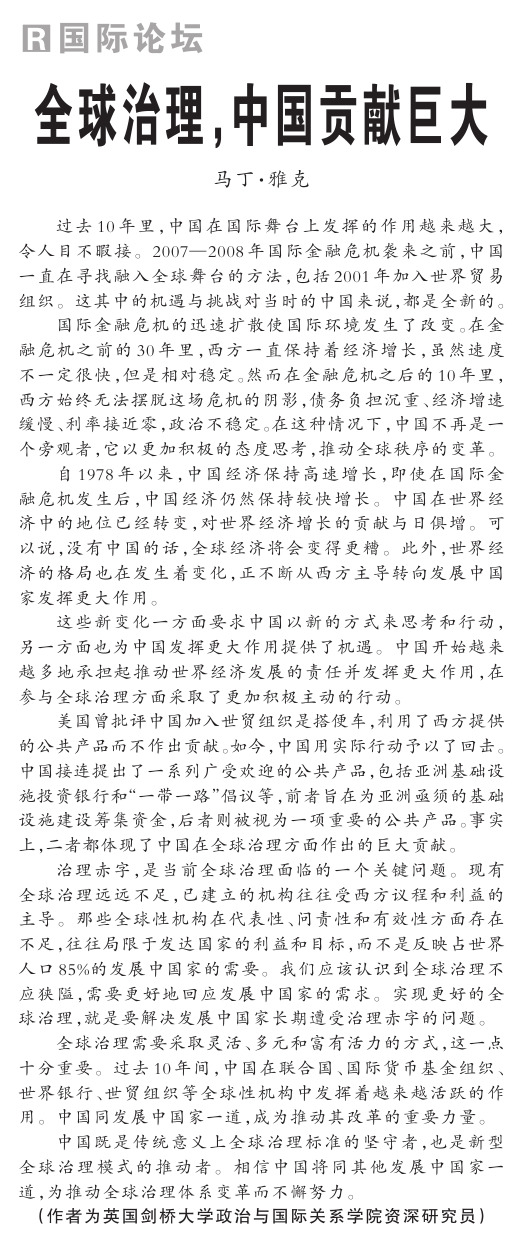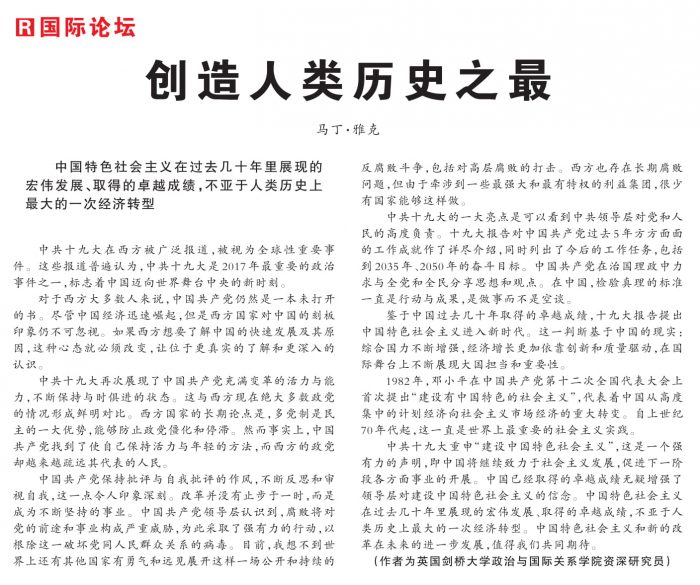The following article by Martin Jacques featured in People’s Daily, 27th November 2017

The following article by Martin Jacques featured in People’s Daily, 27th November 2017

Original article by Arif Nizami in Pakistan Today can be found here.
The China that I saw last week is a far cry from the country that I had first visited with Prime Minister Zulfiquar Ali Bhutto in May 1976. At the time one of the few hotels in town was the Peking hotel where the Pakistani delegation accompanying the prime minister was put up.
Men and women, both were attired in Mao suits plying mostly on bicycles. There were only a few cars on the roads belonging mostly to communist party officials. The first premier of China, Zhou Enlai had died back in January the same year, while Mao Zedong the chairman and founder of modern China was gravely ill.
Bhutto was the last head of state or government who got an audience with Mao when he was suddenly whisked away from an opera performance in his honour to meet the Great Leader. A few months later Mao died and with that an era ended.
The following interview with Martin Jacques appeared in ‘The Paper’, 16th December 2017.
近年来,尽管中国在世界舞台上发挥着愈加重要的作用,但西方对于中国崛起的探讨仍多半集中于经济。2009年,英国学者马丁·雅克(Martin Jacques)出版《大国雄心:一个永不褪色的大国梦》(When China Rules the World: The End of the Western World and the Birth of a New Global Order)一书,从经济、政治、文化、社会等方面全方位地分析中国崛起在全球范围内所引起的经济和地缘政治的重大变化,指出中国作为开启另一种现代化发展模式的先行者,已能够融入世界体系并领导全球新秩序的重塑。
身为中国问题专家的马丁·雅克,是伦敦政治经济学院IDEAS的高级客座研究员以及剑桥大学政治学与国际问题系高级研究员,同时还是亚洲研究中心客座研究员。他现为清华大学访问学者,曾在京都立命馆大学、新加坡国立大学任教,并曾在中国人民大学做客座教授,是英国智库Demos的创始人之一。
The following is an English translation of an article by Martin Jacques that appeared in People’s Daily, 9th January 2018
The 19th Chinese Communist Party Congress marked a new moment in China’s arrival on the global stage. Congresses of the Chinese Communist Party, even in the modern era, have invariably attracted little attention in the West. They have been regarded as neither particularly relevant nor important, rubber-stamp occasions that were difficult to understand or decipher and best left to the China experts. The 19th Congress broke the mould. It was widely reported and recognised in the West as an event of major global importance. Instead of treating the Congress as a somewhat bizarre tribal occasion, some of the coverage displayed a greater sense of seriousness and inquiry. It was widely acknowledged that this was one of the most important political events of 2017. The coverage was further evidence that China has moved to the centre of the global stage.
The following piece featured in People’s Daily, 9th January 2018.

The following is an English translation of an article by Martin Jacques that appeared in the People’s Daily, 22nd December 2017.
At the end of 2017 uncertainty dominates the outlook for the future. As we can now see with great clarity, the Western financial crisis of 2007-8 proved the most important turning point in the West since 1945. For a decade, the Western economies have been mired in varying degrees of stagnation, not least with regard to living standards. And it was the Great Recession that begat the Great Populist Uprising in 2016. The latter signalled the end of the hegemony of neo-liberalism in the West, which began in 1980 with the arrival of Reagan and Thatcher and was characterised by hyper-globalisation, privatisation and a huge growth in inequality. The Uprising was driven by large swathes of the population in both the United States and Britain whose living standards had more or less stagnated for four decades. It was a popular revolt against the governing elites by those who felt left behind and who held these elites responsible for their deteriorating situation. Politically the new mood was articulated most clearly, though not solely, by the right, notably Trump in America and the Brexiteers in the UK.
我们应当铭记,2017年始于习近平主席在瑞士达沃斯世界经济论坛上的演讲。这一演讲的主要观点迅速传遍世界,并被视为对经济全球化的标准界定,将之称为新的全球共识也毫不为过
这是一个充满不确定性的时代。但有一点很明确,对西方而言,2007—2008年爆发的国际金融危机是自1945年以来的一个重大拐点。10年间,西方国家陷入了不同程度的停滞,尤其是在人民生活水平方面。这次大衰退最终导致了2016年西方民粹主义的兴起。民粹主义泛滥标志着始于上世纪80年代、以自由放任的全球化、私有化和收入差距拉大为特征的西方新自由主义支配地位的终结。
(Double click on video for full screen)
In a New Year’s address, Chinese President Xi Jinping lauded the country’s accomplishments in 2017 and gave a road map for China’s priorities in 2018.
2017 has been a big year for China – from President Xi’s travels to Davos to hosting the first Belt and Road Initiative Forum to the 19th CPC Meeting. China is taking the lead across the world and at home. So what’s the outlook for the country this year?
To discuss President Xi’s speech and the future of China in 2018: Victor Gao, a Chinese international relations expert Dan Wang, a China analyst with The Economist Intelligence Unit; Martin Jacques, author of “When China Rules the World” and a senior fellow in politics and international studies at Cambridge University; Jacques deLisle, a professor and director of the Center for East Asian Studies at the University of Pennsylvania.
Part One:
Part Two:
On October 19th, Martin Jacques did this one-to-one interview on China in Washington DC with Anand Naidoo, the host of The Heat, CGTN America’s flagship current affairs programme.
Part One:
Part Two: